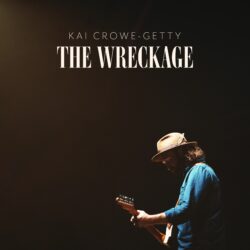A solo album of scars and survival – poetic without being abstract, deeply human and rooted in American soil.
 Kai Crowe-Getty, the frontman of Lord Nelson, has collected together these tracks across a number of years. The result is actually very coherent with songs that deal with grief, nostalgia, resilience and romance – all connected by a real sense of place. Indeed, the geography – Southeastern states, Appalachia, gravel roads, and ghost towns – is never background; it is part of the emotional terrain. Loss appears in many forms – death, break-up or simply time – and this creates a sense of longing throughout the album.
Kai Crowe-Getty, the frontman of Lord Nelson, has collected together these tracks across a number of years. The result is actually very coherent with songs that deal with grief, nostalgia, resilience and romance – all connected by a real sense of place. Indeed, the geography – Southeastern states, Appalachia, gravel roads, and ghost towns – is never background; it is part of the emotional terrain. Loss appears in many forms – death, break-up or simply time – and this creates a sense of longing throughout the album.
Amid the wreckage and weariness, there is still a sense that Crowe-Getty can push on and show resilience – if only barely. He also creates beauty out of the trauma. It’s like watching a car on fire: there’s destruction, but the wreckage still provides a warm glow. Musically, there is a Springsteen-style pulse in the songs but filtered through artists like Jason Isbell, Justin Townes Earl and American Aquarium. The album is at that wonderful intersect between americana and rock: drums, bass and electric guitar solos are supported by pedal steel, strings and harmonies.
“The Wreckage” captures the attention immediately. The opener – ‘A South East State’ – has a lovely, simple guitar line which manages somehow to convey a romantic nostalgia but feel uplifting at the same time. A strong sense of longing permeates this song, and it feels like a meditation on family, memory and the pull of home. The opening paints a vivid scene – photographs, fading relatives and a funeral by the bay. But there is ambiguity, too. “The bow bends but it never breaks/Kudzu vines and a sense of fate” sings Crowe-Getty, suggesting resilience but also a quiet tension. Kudzu vines might be ubiquitous, but they terrorise other plants.
The emotional heart of the album may well be its title track, ‘The Wreckage’. This is a raw and redemptive song about addiction and trauma, but also the process of healing. It is possible to go through hell, see relationships break down, but still come back. The chorus offers a moment of light – “This world ain’t done with you” – a tribute to endurance and the possibility of recovery. The song has a lower tempo, more expressive guitars and some lovely, subtle harmonies – all of which add to the contemplative feel of the track.
Songs such as ‘Brass Angels’ and ‘American Radio’ showcase the romantic side of Crowe-Getty’s work. The former is a classic heartbreak song, with music to match. The brass angels provide a lovely metaphor – once joyful, but now still – and evoke the collapse of a once-beautiful intimacy – “We made love and they’d go dancing round our heads”. And ‘American Radio’ is an aching road trip of a love song painted with dusty dashboards and adolescent nostalgia, enhanced by a wonderful, fuzzy guitar solo.
While Crowe-Getty touches on the darker side of life, he doesn’t leave us there. The final song, ‘Whole Damn World’, is an upbeat and uplifting finale which offers some respite from the lyrical intensity. There is a lovely twist – and message – in the final line, “Don’t let it get you down”. Perhaps there is some earned comfort.
“The Wreckage” isn’t just a collection of songs – it feels like a lived-in companion to the harder seasons of life. Crowe-Getty offers no easy answers, no sweeping redemption arcs, but instead something more meaningful: moments of clarity, memory, and grace, held together by grit and melody. It’s a record for anyone who’s carried the weight of loss but kept moving forward – slow, scarred, but still singing.


